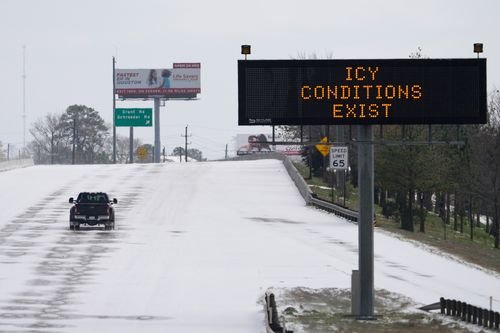What to do if you’re in the middle of a power outage

Texas is colder than it’s been in decades, one of at least 25 states under a winter weather advisory during this week’s historic cold outbreak.
But as Texans scramble to stay warm, rolling power outages have begun across the state following high demand.
Millions of customers across the US have lost power, with much of those outages occurring in Texas. Power outages can be dangerous for those unprepared for such intense winter chill.
If you’re among the Texans whose power has gone out or will go out at some point this week, here’s what you need to know to stay warm and safe this week.
Stay home
Staying indoors is your best bet at staying safe during a winter power outage, the US Centers for Disease Control and Prevention says.
Stay off the roads if you can — icy conditions could lead to car accidents. Just last week, at least nine people were killed in car crashes triggered by winter storms in the Dallas-Fort Worth area, including six who died in the 133-car pileup in Fort Worth.
Take stock of the essentials
In case the power outage lasts a few days, you should have the following on hand:
- Extra food and water: A three- to seven-day supply is a good standard
- Flashlight and extra batteries
- Battery-powered radio
- Extra medicine
- First-aid supplies
If you need to make a trip outside, keep it as brief as you can, and layer up, the CDC says. Check with your local emergency authorities to make sure it’s safe to drive or travel in the cold.
Stay warm
Layer up — it’s going to get cold. In extreme cold, the Houston Office of Emergency Management recommends wearing at least three layers of tops, plus an outer layer to block out wind, and two layers of bottoms. A hat, gloves and a warm face mask are musts, too.
The CDC recommends warming up with extra blankets, sleeping bags and winter coats.
It’s not safe, though, to keep blankets and other flammable materials near alternate sources of warmth like a portable space heater. Keep the heaters in an area clear of flammable fabrics.
If you’re using a fireplace, first make sure it’s properly vented to the outside and won’t leak gas into your home. You should keep it stocked with dry firewood — not paper, the CDC says — throughout the power outage.
To keep in heat, close blinds and curtains and shut doors to rooms to avoid “wasting heat,” the National Weather Service recommends. Stuffing towels in the cracks under doors can keep some of the chill out of your home, and eating and drinking throughout the power outage will help keep your body warm.
Keep your food & water supply safe
Avoid opening your fridge or freezer during the power outage to keep your food cold. According to the Federal Emergency Management Agency (FEMA), a fridge can keep food cold during an outage for about four hours, and a freezer will keep its temperature for about 48 hours.
Fill coolers with ice, if necessary, to keep food from spoiling.
Some water purification systems may not function fully when the power goes out, the CDC warns. You can check with local officials to make sure your water is safe — they should give you specific recommendations for treating water in your area.
Be careful of carbon monoxide
Generators can release poisonous carbon monoxide if you use them inside your home. If you’re using one this week, keep it outside, about 20 feet away from your home, the CDC advises.
You should never use a gas stove or oven to heat your home, according to Ready.gov, the US government’s online disaster planning resource.
If it’s safe, go somewhere warm
If it’s safe for you to travel to a shelter, be sure to wear a mask or layer two masks and bring extras in case your stay is extended. These locations should be well-ventilated, though social distancing is still advised, according to Ready.gov.
Know the signs of hypothermia
Babies, older adults and unhoused people are the most vulnerable to hypothermia. If you’re worried about people in these groups, look for the signs: Confusion, shivering, difficult speaking, sleepiness and stiff muscles in adults, and bright red skin and low energy in babies, according to the CDC.
If you fear someone in your household has hypothermia, call for medical help. If they can’t immediately arrive, try to warm them up yourself with blankets, food and water and an alternate heat source.
Conserve power if you still have it
Start by turning off and unplugging nonessential lights and appliances, and don’t use large appliances like ovens or washing machines if you can avoid it, the Houston Office of Emergency Management suggests.
Turn down your thermostat to 68 degrees or lower — if too many people crank up the heat, the demand could trigger another blackout.
During the day, if it’s sunny, open your blinds so the sun can heat your home, but close them at night to prevent losing heat.
Check on your loved ones
When safe to do so, check in with the people around you to make sure they’re OK.
Those who have medical equipment that require power, like respirators, should be taken to locations with generators or a friend’s or neighbor’s home that hasn’t been impacted.
Keep your pets warm
Don’t leave pets outside when it gets cold. Move them into a shelter inside where they’ll stay warm, the Humane Society of the United States advises.
If you’re walking your dog (though outdoor activity should be brief), consider wrapping them up in a sweater or coat — pets can get hypothermia, too.
Look on your pet’s paws for rock salt or other chemicals used to melt ice. Those chemicals can irritate your pet’s feet, so wipe them down with a warm, damp towel upon returning home.
If you have a reptile or another pet that relies on outside sources of warmth, you can heat them up with hand warmers, a generator (again, used only outside your home) or snuggling, says PetCoach, an online veterinary database from Petco.




